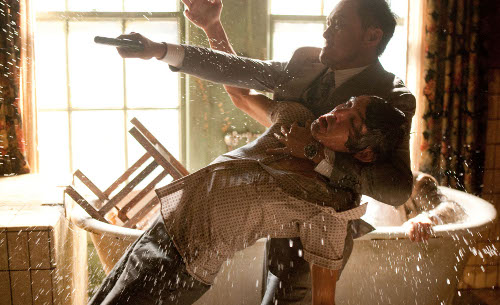In Tom DiCillo’s 1995 indie hit Living In Oblivion, a hip but pretentious film director (Steve Buscemi) is memorably taken to task by a diminutive actor (Peter Dinklage): "Have you ever had a dream with a dwarf in it? Do you know anyone who’s had a dream with a dwarf in it? No! I don’t even have dreams with dwarves in them! The only place I’ve seen dwarves in dreams is in stupid movies like this! Well, I’m sick of it! You can take this dream sequence and stick it up your ass!"
Thankfully, there are no dwarves in director Christopher Nolan’s Inception. Nor are there any clowns or unicorns, those other cliched cinematic sleepy-time staples. Leonardo DiCaprio does keep bumping into his dead wife, though, but anyone who saw Shutter Island earlier this year will know that’s par for the course. However, the fact his characters from two high profile releases this year experience such parallel visions can be put down to a quirk of film distribution scheduling, and should not derail moviegoers into thinking Leo is lazily retracing steps along a well-worn path.
In Inception, dreams are the new battlefields of corporate espionage. DiCaprio heads up a crack squad of brain burglars (who include Joseph Gordon-Levitt and Tom Hardy) getting paid big bucks to sneak into the heads of sleeping industrialists to ‘extract’ secret information and give their business rivals the upper hand. But energy mogul Ken Watanabe has a different use for the team’s talents, enlisting them to plant new thoughts in slumbering Cillian Murphy (an ‘inception’, if you will) before he inherits his father Pete Postlethwaite’s empire and brings the world to the brink of ecological meltdown.
The trouble is that DiCaprio, the team’s ‘architect’ who, for want of a better phrase, set dresses the subject’s dream world with buildings and people to give the power of suggestion a little more oomph, is seriously off his game after witnessing the death of his wife Marion Cotillard. Enter idealistic young rookie Ellen Page, whose own precocious head-invading skills suggest she has the potential to become the hot-shot Leo once was.
It’s pure hokum, of course, but not a million miles away from the mind control assassination plot of a film like The Manchurian Candidate, albeit with a suitably more modern – if muddied – moralistic agenda. Can someone’s subconscious be so radically altered as to effect worldwide change for the better? It’s a big question, but is asked in tandem with some equally big special effects and the kind of shoot-outs and explosions Jason Bourne has for breakfast. Make no mistake, this is a popcorn crowd-pleaser with the tension cranked up to the max, our heroes on a do-or-die mission that could find them ‘sleepwalking’ in a parallel universe with no way back.
But for all Inception‘s breathtaking collapsing skyscrapers and zero-gravity gun battles, Nolan still shows considerable restraint in his dream worlds; how many directors could have resisted the temptation of shoehorning a little outlandish sex, a few celebrity cameos or sporting prowess fantasies into the mix, let alone the aforementioned dwarves or clowns?
Nolan is an old hand when it comes to scraping the internal workings of the noggin with a big screen spatula. Beyond the expected issues of duality and identity he touched on in Batman Begins and The Dark Knight, he delighted in clicking on the ‘previous post’ icon in amnesiac Guy Pearce’s brain in Memento, and even the bleached-out hyper-reality of the Alaskan midnight sun played havoc with Al Pacino’s sleep-deprived perception in Insomnia. Here, while DiCaprio’s posse has the standard spy’s box of tricks (technological gizmos, powerful narcotics, seemingly limitless funding), the director never loses sight of the fact that the murky depths of the human head always hold the trump card and can’t be relied upon to do exactly what we might want.
Page’s character is integral to the plot. As the newcomer to the team, she acts as the audience’s voice, asking the right questions at the right time to accommodate swathes of background information and exposition, while also putting forward a few niggling thoughts about the ethics of the whole operation. At a stretch, this could be read as Nolan attempting to spark a debate about psychology as a money-spinning business in which experimental drugs and radical therapy overshadow the essential well-being of the patient, but it’s not something dwelled upon for too long.
Reality has a pesky habit of applying rules that serve only to hamper a filmmaker’s vision, so Nolan has instead scripted a complex tale where, in theory, anything goes.
Because the bulk of the action takes place inside either DiCaprio’s or Murphy’s head, Inception doesn’t have to follow the conventions of logic. Need another half dozen bad guys wielding semi-automatics? There they are in the blink of an eye. Want a Parisienne street to rise up and fold over on itself like a big bricks-and-mortar pastie? Done. What to do when an unexpected character turns up in the middle of the action? Dial REM for murder.
Like Memento, it’s a movie that may well benefit from repeated viewing, its ideas and dramatic twists revealing themselves with more clarity as they become more familiar. That’s not to say Inception is either incoherent or impenetrable, but its psychological landscapes make for obstacle-strewn terrain that disturbs as much as it thrills. Some viewers may struggle to process the experience immediately after leaving the cinema, unable to fully articulate their thoughts about what they’ve just seen. It might be best to sleep on it.



